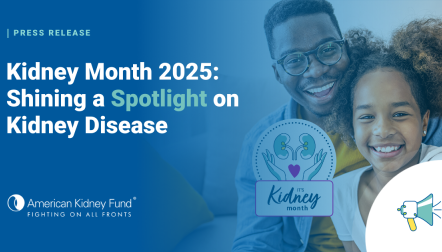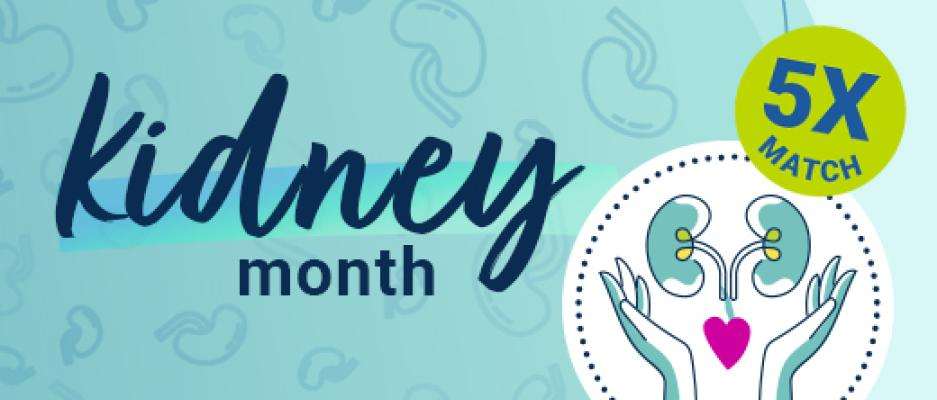
Veterans and kidney disease
The American Kidney Fund (AKF) has partnered with the U.S. Department of Veterans Affairs (VA) Veterans Health Administration to increase awareness of kidney disease among U.S. veterans and to support veterans who have been diagnosed with kidney disease.

As a group, veterans have higher rates of chronic kidney disease (CKD) than the general U.S. population. While kidney disease affects 1 in 7 Americans, it affects about 1 in 6 veterans, including more than 40,000 VA-enrolled veterans with kidney failure (end-stage renal disease or ESRD) who rely on dialysis or a kidney transplant to survive.
Kidney disease risk factors
Diabetes is the leading risk factor for kidney disease and the most common cause of kidney failure, with more than 34 million people in the United States diagnosed diabetes. Following a kidney-friendly eating plan, being active and taking medicines as prescribed by your doctor can help you manage diabetes and prevent health problems like kidney damage.
High blood pressure is another leading risk factor for kidney disease and the second most common cause of kidney failure, with 1 in 3 U.S. adults diagnosed with high blood pressure. Keeping your blood pressure under control can help prevent kidney disease or keep it from getting worse.
Other risk factors for kidney disease include:
- Having a family member with kidney disease
- Being Black, Hispanic or Latino, Native American, or Asian American
- Being over 60 years old
- Having heart disease
- Being obese
- Smoking or using tobacco
- Having a history of acute kidney injury (AKI)

Managing your kidney disease
If you have kidney disease caused by diabetes or high blood pressure, there are steps you can take to manage your kidney disease and keep your kidneys from failing. Following a kidney-friendly eating plan, taking your medicine as directed, and working with your doctor can keep your kidney disease from getting worse. To learn more about ways to manage kidney disease as a veteran, download this guide.
Treatment options for kidney failure for veterans
When you have kidney failure (also called end-stage renal disease or ESRD), it means your kidneys have stopped working. You will need to start dialysis or receive a kidney transplant to treat your kidney failure.
Dialysis is a treatment to clean your blood when your kidneys are not able to. It helps your body remove waste and extra fluids in your blood. It does some of the work that your kidneys did when they were healthy. There are 2 types of dialysis, hemodialysis, and peritoneal dialysis.
To learn more about your different options, download AKF's Empowering Choices: Your guide to making an informed home dialysis decision.
A kidney transplant is a surgery to give you a healthy kidney from someone else's body. A kidney transplant may come from a living donor or from a deceased donor. A kidney transplant is not a cure, but a treatment for kidney failure. You will need to take medicines and take special care of your transplanted kidney for the rest of your life. AKF's Your Guide to Kidney Transplant is a great resource to learn about the transplant process.
Benefits for veterans
Veterans with kidney disease may be eligible for any one of AKF's grants or financial assistance programs. Additionally, the U.S. Department of Veteran Affairs (VA) offers enrolled veterans kidney services that can help slow down and prevent kidney failure, including screening to prevent kidney failure, early management of kidney disease, kidney biopsy to assess for kidney disorders, management of blood pressure, anemia, bone disorders, and kidney stones, in-center or home dialysis, and kidney transplantation. Click here to download a handout on benefits for veterans.
Veterans and mental health
Mental health challenges are common among veterans, with about 43% of veterans experiencing post-traumatic stress disorder (PTSD), depression or substance abuse. Chronic illnesses such as CKD can increase the likelihood of experiencing mental health challenges.
After going through or witnessing a traumatic experience, it's common to experience challenges, such as feeling on edge or difficulty falling asleep following a distressing event. At first, it may be difficult to carry out your regular daily activities as you used to, but many individuals begin to feel better within a few weeks or months. If your symptoms persist for more than a few months, consult with your health care provider to determine your next steps. The good news is that there are effective treatments available.
PTSD treatment can help you manage your stress and feel comfortable in the world. There are several forms of treatment available, including talk therapy and medicine. It's important to understand that no one treatment works for everybody. Speak with your health care provider to help you decide which treatment is best for you.
If you are experiencing any mental health challenges or are feeling overwhelmed by your emotions, there are many resources available to help you:
- Veterans Crisis Line: Dial 988 and press 1 or text 838255 to access free, confidential support for veterans 24/7.
- Veteran Caregiver Support: Call the Caregiver Support Line to learn more about the support available and to connect with the Caregiver Support Team at 1-855–260–3274. Available Monday through Friday between 8 AM to 8 PM ET.
- NKF PEERs: Get connected with a kidney patient, donor, or care partner like you
- National Alliance on Mental Illness (NAMI) Resources: Reach out to someone who can help through one of the various resources
Coffee Chat with the Veterans Health Administration
Watch the conversation between Erica Scavella, M.D., FACP, FACH, Assistant Under Secretary for Health for Clinical Services, VHA and LaVarne Burton, President and CEO, American Kidney Fund, about CKD and how it impacts the veteran population.
Get assistance from AKF
Learn more about the various financial assistance and support programs AKF offers to people living with chronic kidney disease.


